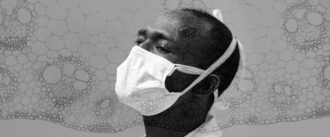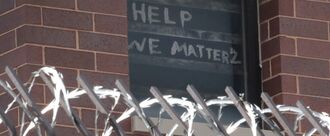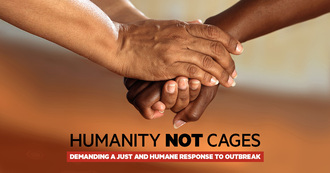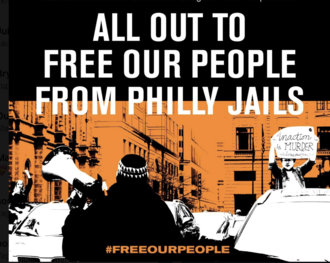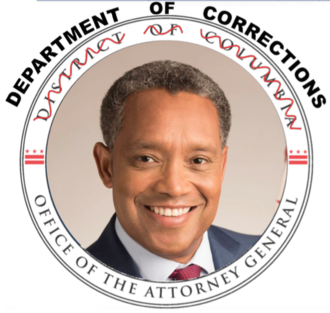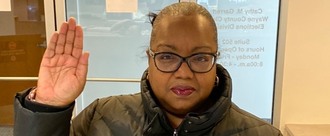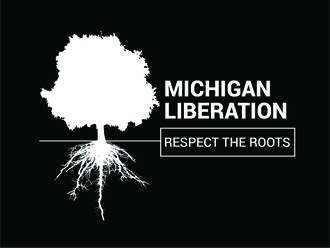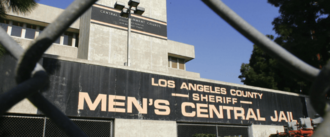- Featured
- Afropunk Army
- Community Control
- Confederate Symbols
- Cop Watch
- Corporate Accountability
- Criminal Justice Policy
- Drop/Bring Charges
- Economic Justice
- Education
- Employment Discrimination
- End The War on Black People
- Environmental Justice
- For-Profit Colleges/Universities
- Gulf Coast
- Housing Rights
- Immigration
- Invest-Divest
- Media Accountability
- Music Industry
- No Guns in Schools
- Open Internet
- Police Accountability
- Political Power
- Pop Culture
- Private Prisons
- Reparations
- Reproductive Justice
- Right Wing Racism
- School-to-Prison Pipeline
- Sports
- Voting Rights
- Wrongful Imprisonment
- More
-
Demand Governor Kemp extend the shelter in place order in Georgia!There are currently 25,939 active cases of Covid-19 in Georgia. Lifting the shelter in place will only contribute to the spread of Covid-19. We need Georgia to remain closed until medical research and scientific models show that it is safe to reopen. My mother Joeann Snead could have been your mother, daughter, aunt, or friend. Help to flatten the curve by demanding Governor Kemp to extend the shelter in place order.783 of 800 SignaturesCreated by Catolyn Merriweather

-
We Demand Racial Data and Equity in Testing during COVID-19In Chicago, Black people make up 70% of the people who have died due to coronavirus despite making up 32% of the population. In Michigan, Black people make up 14% of the population, but represent 40% of all COVID-19 deaths in the state, most of which are in the Detroit metro area. And in New York city, Black people are dying at twice the rate of the total population. These numbers are devastating but not surprising. From disparities in testing and treatment to the realities of implicit bias and an unequal healthcare system, we know that our people are carrying a disproportionate share of the burden of this public health emergency. But without access to nationwide data, we simply cannot measure its impact on the most marginalized members of our communities. In the past few weeks, every one of us knows someone whose family, friends or loved ones has been affected by this crisis. We need a comprehensive picture of what is happening if we are going to be able to come up with solutions to protect ourselves and each other. That’s why we are asking you to join us in calling on the federal government to collect nationwide demographic COVID-related data that will help us ensure greater equity in testing and treatment. As leaders committed to intersectional racial justice, Native Son, the Human Rights Campaign and The Body specifically call for the following: --Consistent and readily accessible publication of anonymized COVID-related racial and demographic data including testing rates, test results, hospitalizations, treatment, and mortality in compliance with existing healthcare privacy laws. --Development of a comprehensive, standardized data collection and publication protocol across all actors in the virus response including local and state public health departments and private companies providing testing and laboratory services. --Required comprehensive data collection and reporting for all healthcare system recipients of federal COVID relief funding across an expanded set of demographics including race, ethnicity, sexual orientation, gender identity and expression, socioeconomic status, and engagement with the criminal legal system among others. --Strong collaboration between the federal government and private testing and laboratory companies to ensure the collection and reporting of comprehensive demographic data in compliance with existing healthcare privacy laws. Although President Trump and other White House officials have recently acknowledged the racial disparity in COVID-19 deaths, the Centers for Disease Control has failed to provide complete nationwide racial demographic data on the impact of COVID-19. The limited data on race and ethnicity provided by state and local governments is inconsistent and not readily accessible. And there is currently no federal mechanism mandating data collection on other highly marginalized identities, including sexual orientation and gender identity. This means the recorded numbers of COVID-19 cases and deaths in our communities are being vastly underreported. And that means that we are not receiving the relief, testing, and treatment we need. Public health experts agree that the failure to establish a robust testing protocol during the initial phase of our national response put all Americans at greater risk than necessary of exposure to the virus and severely limited our ability to contain the spread. In Puerto Rico, the reported testing rate is a mere 15 tests per day for every 100,000 people. Now, as the disease caused by the virus claims thousands of lives each day, the compounding effects of structural racism on disease prognosis is starting to come into sharper focus. Until we are given access to data that shows the full impact of this crisis on our communities, we will not be able to coordinate resources to the places and people that need them most. Join us in demanding that the federal government collect nationwide, demographic COVID-19 related data today.2,072 of 3,000 SignaturesCreated by National Black Food Justice Alliance
-
Tell Governor Brian Kemp to implement a rent freeze and moratorium on all evictions in Georgia!Coronavirus (COVID-19) is now officially classified as a pandemic and the National Institute of Allergy & Infectious Diseases Director has stated, “it’s going to get worse''. Across media outlets, the prevailing safety precautions include “wash your hands" and “stay home”. However, residents in this state are not guaranteed to have access to these basic necessities. Water shut-offs, evictions and homelessness significantly worsen the threat posed by COVID-19. If more residents are evicted during this period, COVID-19 could start to spread more rapidly among those who become homeless. We cannot afford to have more emergencies on top of the current emergency. We urge Governor Brian Kemp to be an example for the nation while he stands with his constituents and implement a rent freeze and moratorium on all evictions in the state of Georgia.647 of 800 SignaturesCreated by Sandy G Johnson
-
Demand that Cook County State's Attorney Kim Foxx Decarcerate to Respond to COVID-19As of April 14, 2020, more than 300 people incarcerated in CCJ have tested positive for COVID-19 and 3 people have lost their lives. The rate of infection has climbed as high as 62 out of every 1,000 people incarcerated in the jail, and there are no doubt many more people who have COVID-19 but who have not been tested. Cook County Jail has been identified by the New York Times as the “top hot spot” in the nation’s pandemic. People incarcerated in jail are one of the populations most vulnerable to coronavirus and COVID-19, and their protection warrants special emergency action. Jails and prisons are known to quickly spread contagious diseases. Incarcerated people have an inherently limited ability to fight the spread of infectious disease since they are confined in close quarters and unable to avoid contact with people who may have been exposed. Cook County Jail is a death trap, and leaving people incarcerated there during this pandemic will result in the needless illness, suffering, and deaths of people in the jail’s custody, staff working inside the jail, and others in the community as our shared health care system becomes overwhelmed. As a candidate who campaigned on a progressive platform, it is State’s Attorney Kimberly Foxx’s responsibility to take bold action now. If State’s Attorney Foxx continues the present course, more people will inevitably and unnecessarily lose their lives.2,730 of 3,000 SignaturesCreated by Matthew McLoughlin

-
Decarcerate Prince George’s County Jail NOW!Prince George’s County jail is a hotbed of human rights abuses in the midst of the coronavirus crisis. Credible reports from whistleblowers inside of the Prince George’s County jail detail how correctional officers and jail officials have ignored early cases of COVID-19 contributing to community spread, penalized those who were infected, failed to provide adequate medical care, and resorted to illegally detaining people who have been bonded out but are exhibiting symptoms consistent with COVID-19. When not ignored entirely, symptomatic detainees are given nothing but Tylenol and sent back and forth between their housing units and the medical unit, exposing numerous others along their route. In certain housing units, detainees are punished or threatened with punishment by trying to use their clothing and linens to fashion personal protective equipment they are otherwise denied. For those who do test positive for Coronavirus, they are locked in an isolation cell where blood, feces, and mucus covers the walls. In the isolation cell, they are denied basic hygiene supplies, such as toothbrushes and toothpaste, for days. They are not allowed to shower for at least two weeks. During that time, they are forced to wear the same clothing for days, sometimes even a week or more, and often the same clothing in which they sweated through their fevers. They are denied access to telephones and any ability to communicate with the outside world. Even within the medical unit, any medical conditions that can’t be addressed through routine medication are ignored. They are trapped in cages, treated like animals, rather than the human beings they are. COVID-19 cases in New York, Chicago, and Washington, DC show that jails become ground-zero for pandemics because they are ill-equipped to allow social distancing, provide PPE, and provide adequate sterilization. The best way to contain the virus is to release as many people as possible from detention, limit the number of arrests in order to stem the flow of people in and out the jails and provide critical medical care for those who remain incarcerated during the pandemic.1,846 of 2,000 SignaturesCreated by Qiana Johnson, Life After Release

-
Philly Courts and Mayor Kenney: Act Now to Mass Release People from Jail as Coronavirus SpreadsDozens of incarcerated people and prison workers are infected with coronavirus. Yet the Philadelphia courts are forcing the public defenders, private defense attorneys, and the district attorney to approve individual petitions to be seen by judges. That's meant that our jails have only decarcerated by 8-10%, while other cities have let more than half of their incarcerated population go.1,457 of 2,000 SignaturesCreated by The Media Mobilizing Project
-
COVID-19 is a death sentence for the people inside D.C. Jail & Halfway Houses #DecarcerateDC NOWFrom the moment the Mayor declared a public health emergency, defense lawyers have filed hundreds of motions in D.C. Superior Court demanding the release of their clients. Despite the flood of motions, D.C. Superior Court judges continue to operate as if business is usual. Rather than acknowledge the life or death circumstances at the D.C. Jail, judges are callously denying bond review motions and continuing to detain countless individuals. While the judges quickly shut down courtrooms to protect their own health and well-being, they have refused to show this same level of concern to the people whose lives hang in the balance inside of the D.C. Jail. With each ruling, the D.C. Superior Court judges are reinforcing a clear reality that Black and Brown people have long known: courthouses are a place where the lives of some are valued and the lives of others are not. But it is not only judges whose inaction risks the lives of everyone at the D.C. Jail. Attorney General Karl Racine has also made clear where he stands on the issue. Despite his self-serving, political rhetoric of being a “progressive” prosecutor, Racine’s actions show that he is nothing more than a politician who says one thing but does another. When the global health pandemic first started to impact the United States, Attorney General Racine authored an op-ed and signed onto a public letter creating the guise that he actually values the lives of incarcerated people. He wrote, “[Prosecutors] should use their discretionary authority to decrease the number of people in jails and prisons by immediately limiting the number of people prosecuted and unnecessarily detained pre-trial.” He urged all jails to “[p]rovide free soap and CDC-recommended hand sanitizer, increased medical care, comprehensive sanitation and cleaning of facilities and other safety measures.” He went on to say that jails should “[use] individual quarantines . . .rather than harmful practices like solitary confinement or generalized lock downs.” It is now clear that at the time he wrote these words, he never imagined he would one day be held accountable to ensure that these conditions were in place in his own backyard. On March 30, 2020, the Public Defender Service for the District of Columbia (PDS) and the American Civil Liberties Union for the District of Columbia (ACLU) filed a federal class-action lawsuit against the Department of Corrections. As evidenced by declarations attached to the complaint, the men and women at the D.C. Jail are being held captive in conditions that amount to torture. Despite the spread of this highly contagious and deadly virus, the DOC is not providing proper medical care and ignoring the desperate cries for help from the sick. The DOC has locked everyone in their cells, often with two people in the same cell, for 23 ½ hours a day. As if this was not horrific enough, the DOC has refused to provide hand sanitizer, basic cleaning products, or even adequate amounts of soap, so people can try their best to protect themselves from a virus that may kill them. Conditions in the jail are so brutal that the union representing the correctional officers who work there are supporting the ACLU’s lawsuit against their own employer, the DOC. According to the union’s attorney, “The DOC management has created an unconscionable public health crisis, and almost certainly guaranteed and accelerated the rampant spread of COVID-19 within the DOC facilities and the communities in which the staff live.” The people trapped at the D.C. Jail are watching and waiting helplessly for the day when their own bodies are ravaged by its symptoms. As the Attorney General for the District of Columbia, Racine’s office represents the Department of Corrections in this suit. Right now, Racine has the opportunity to rise to the challenge and ensure that the DOC complies with his own public proclamations. Instead, Racine is exposing himself as an opportunistic and hypocritical politician. The cowardice of D.C. Superior Court judges and the hypocrisy of Attorney General Karl Racine are no longer just ugly character flaws, they are obstacles endangering the lives of everyone held at the D.C. Jail. We demand that the people of the D.C. Jail be freed. We will not forgive and history will not forget.15,325 of 20,000 SignaturesCreated by April Goggans, Black Lives Matter DC
-
Kym Worthy-COVID-19 DemandsThe decarceral guidelines below are designed to prevent three things: social spreading, jail “churn,” and the deaths of vulnerable people. Social Spreading In order to prevent the rapid growth of COVID-19 from overburdening our health-care system and claiming lives, both those in secure facilities and the people who work in them, it is the responsibility of decision-makers at every level to prevent and contain the spread of the virus by taking action to promote the most effective strategy in abating the pandemic: social distancing in order to slow “community spread.” The Particular Issue of Jail and Prison “Churn” Jails and Prisons combine the worst aspects of a cruise ship and a large public gathering and, thus, can be the perfect breeding ground for the spread of COVID-19. People are constantly booked into and out of jail and prison facilities and each night guards, vendors, and other jail staff are going home while others are coming in- which results in a massive turnover. For example, more than half of the people in jail are only in there for two to three days. Further, enclosed structures like jails can cause COVID-19 to spread like wildfire and introducing just one person with it can lead to it impacting not just everyone inside the jail or prison but anyone leaving the facility—whether a person who is released or staff returning back to their homes— who then interact with their communities. Preventive Measures Cannot Be Taken in Jails and Prisons. Experts recommend that to protect the people most vulnerable from death or serious illness from COVID-19 that they are appropriately separated through social distancing. Yet separating sick people from well people to prevent the disease from spreading can be nearly impossible in prison due to logistical considerations.1,776 of 2,000 SignaturesCreated by Nicholas Buckingham
-
Michigan Covid-19 Statewide Immediate Release of Vulnerable incarcerated PeopleCovid-19 presents a threat to human life. We believe all human life is valuable, and are ensuring that those most at risk, like incarcerated individuals, are being granted the relief necessary to protect themselves and their families. The particularly vulnerable incarcerated community members and those currently being impacted by the system need support in this moment and not continued trauma. Action is crucially important now to avoid public health mishaps like the scabies outbreak at Huron Valley Prison in 2019. Now more than ever, we need transformative criminal justice action to limit the damage that the system can do during the pandemic outbreak.2,365 of 3,000 SignaturesCreated by Tim Christensen
-
COVID-19: Los Angeles Must Immediately Release People from the County Jails!We are not alone in recognizing this crisis of criminalization and incarceration here in Los Angeles and how COVID19 will exacerbate that crisis. Last week, the Los Angeles County Board of Supervisors approved the recommendations outlined in the Alternatives to Incarceration Working Group’s historic and unprecedented report, “Care First, Jails Last: Health and Racial Justice Strategies for Safer Communities.” Shortly thereafter, Supervisor Mark Ridley Thomas published a letter outlining his concerns about COVID19’s spreads to the LA jails and calling for a reduction in jail bookings, early release, plans for quarantine and treatment, concerted efforts to reduce virus transmission and a plan for expected staffing shortages. We are also not alone in calling for significant and timely steps towards decarceration. On Saturday, March 14, Judges from the Cleveland, Ohio’s Cuyahoga County Court announced their intention to seek the release of hundreds of people incarcerated in their county jails. Like us, these judges recognize that jails pose threats to our larger community and the incarcerated people themselves. On Tuesday, March 17, the New York City Board of Corrections, the independent oversight Board for the city’s jail system, issued a call for incarcerated people at high risk to be immediately released and for the overall jail population to be rapidly and drastically reduced. Also on Tuesday, March 17, thirty one elected prosecutors from around the country, but not from Los Angeles, published a letter advocating that counties “implement concrete steps in the near-term to dramatically reduce the number of incarcerated individuals” to prevent the potentially “catastrophic” spread of COVID19. We also join epidemiologists in warning that it is not a matter of if COVID19 enters your facility -- but when. For these reasons, we demand that you, as correctional health care leaders, do your part. We ask that you: 1) Prepare a list of your incarcerated patients who are most medically vulnerable and who require immediate release. We demand that you prepare that list within one week, notify the public that the list has been made available to correctional authorities, the courts and city/state leaders, and advocate for their early release with linkages to housing and healthcare services. 2) Use the legal authority granted to you to declare COVDI19 a liable danger to those currently held in the county jails and advocate for their immediate release to safe and meaningful housing. 3) Identify, coordinate and provide the services incarcerated people need upon their release (e.g. HIV care for those who are HIV+, substance use treatment centers for those with substance use disorders, homes and shelters for those who are houseless, etc) to ensure their ongoing protection from this epidemic. The County should use the recently approved recommendations from the Alternatives to Incarceration Working Group to build infrastructure that addresses and also outlives this emergency to achieve our shared goal of reducing the jail population.1,550 of 2,000 SignaturesCreated by Mark-Anthony Clayton-Johnson
-
Prevent the Spread of COVID-19 by Decarcerating MecklenburgDear local leaders: As the coronavirus pandemic continues to spread, we – a coalition of concerned organizations, attorneys, and community members – urge you to undertake all possible measures to prevent the spread of infection in Mecklenburg County’s jails. An outbreak of COVID-19 in the jails would be swift and deadly, and it would overwhelm the county’s hospitals and health system. The next week is crucial to limiting COVID-19’s spread. Now is the time for decisive emergency measures to save lives. COVID-19 poses severe risks whenever people are in close physical proximity with others, regardless of whether an individual has shown symptoms of infection. People in jail are unable to distance themselves from others and take the preventative measures that are necessary to prevent infection and protect the population. Worse, jails are particularly vulnerable to outbreaks because the underlying health conditions that can cause infection or exacerbate harm are very prevalent among incarcerated people. This will make the spread of COVID-19 inside jails fast and lethal, threatening everyone incarcerated in a jail, along with their loved ones, jail staff, and the state’s public health infrastructure at large. The safest way to ensure that the jail does not become a vector for COVID-19’s spread is to cut the jail population and halt new admissions. This is particularly imperative for anyone who a judge has already approved for release pending payment of money bail; anyone detained under an ICE hold; and anyone detained for a Failure to Appear or parole/probation violations. Release is also crucial for those who are elderly or have medical conditions that make them particularly vulnerable. In contrast to reducing jail populations, restrictive measures such as segregation and lockdowns will not contain infection. In a county jail, people are incarcerated for a relatively short period of time before returning to the outside community, and every day new people are booked into the facility if law enforcement continue making arrests. Jail staff necessarily come and go everyday as well, returning to their families and communities. This constant turnover will compromise any effort to contain COVID-19, especially since people may be infected and contagious but not show symptoms. Restrictive measures inside could also discourage incarcerated people from reporting symptoms or seeking care, which will multiply infection. Reducing the jail population is consistent with the county sheriff’s obligation to safely manage county jail populations and the guidance of correctional experts. Dr. Marc Stern, who served as Health Services Director for Washington State’s Department of Corrections, recently urged: “With a smaller population, prisons, jails, and detention centers can help diseases spread less quickly by allowing people to better maintain social distance.” Dr. Stern also explained that reducing the jail population will ease staffing burdens: “If staff cannot come to work because they are infected, a smaller population poses less of a security risk for remaining staff.” Jurisdictions across the country have already started taking the important public health measure of reducing their jail population. The Bail Project has worked to provide free bail assistance to people detained pretrial in the Mecklenburg County Jail. Since its tenure in Charlotte began in August 2019, the organization has posted bail for over 200 people, of which more than 90% then returned to court without any need for detention, even though their bail amount would otherwise have kept them incarcerated. We know from this experience that reducing the jail population to protect public health will be safe, lawful, and just. Every time the county introduces another person to the jail environment, there is a risk of worsening the spread of COVID-19 among the incarcerated population, jail staff, and the broader community. We urge you to undertake all possible avenues for limiting that peril and preventing deaths across the community. Signed, The ACLU of NC Global Missions of the A.M.E. Zion Church The Bail Project Beauty After the Bars Black Treatment Advocates Network (BTAN Charlotte) Project BOLT Charlotte Uprising Comunidad Colectiva Mecklenburg County Public Defender’s Office Poor No More Racial Justice Engagement Group of the Unitarian Universalist Church of Charlotte Southeast Asian Coalition Court Support Services Team TRU BLUE963 of 1,000 SignaturesCreated by Decarcerate Mecklenburg
-
Tell Governor Parson to implement a rent freeze and moratorium on all evictions in Missouri now!Coronavirus (COVID-19) is now officially classified as a pandemic and the National Institute of Allergy & Infectious Diseases Director has stated, “it’s going to get worse''. Across media outlets, the prevailing safety precautions include “wash your hands" and “stay home”. However, residents in this state are not guaranteed to have access to these basic necessities. Water shut-offs, evictions and homelessness significantly worsen the threat posed by COVID-19. If more residents are evicted during this period, COVID-19 could start to spread more rapidly among those who become homeless. We cannot afford to have more emergencies on top of the current emergency. We urge Governor Mike Parson to follow the lead of Detroit and San Jose - to stand with your constituents, to stop preventable illness and displacements and implement a rent freeze and moratorium on all evictions, utility shut offs, and job layoffs in the state of Missouri.1,077 of 2,000 SignaturesCreated by Schnell Carraway



